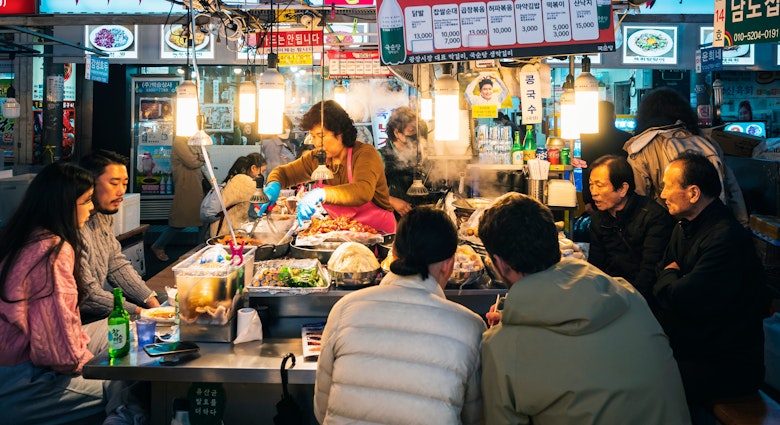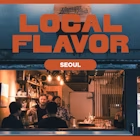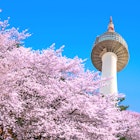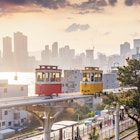
Nov 19, 2024 тЂ 8 min read

The Seokguram grotto alone is worth a trip south from Seoul to see ТЉ nunawwoofy / Getty
Gyeongju City offers a unique glimpse into the long history of the Korean peninsula. History and art buffs particularly will find much to do; the religious and political architecture and relics are duly famous. Family travelers will find it a fine way to introduce living history to their children, as my wife and I did with our kids.
Gyeongju is in the southeast of Korea. It lies off the normal path of tourism in South Korea, which is typically clustered in the northwest, around the capital Seoul. And while there is much to see there, most of it is modern. South Korea today is known for its rapid economic growth and urban cultural products like K-pop. But there is also a long, premodern national history, deeply interwoven with Confucianism and Buddhism, which makes a historical city like Gyeongju a great find.
South Korean development has, unfortunately, led to the demolition of much pre-industrial architecture in favor of gleaming, modernist cities. But Gyeongju, by government decree, maintains its archaic feel. Even modern construction in the city must deploy the sloping wooden roofs characteristic of the older buildings. Our children find humor in seeing a gas station or restaurant with such decor too. But it helps retain the old-time feel, and it is refreshing to see a government make such a preservationist effort, even blocking otherwise valuable development projects in order to ensure the physical survival of large-scale architectural relics.
The endangered royal dogs of Gyeongju

The city has multiple Unesco World Heritage sites clustered in its reach. Perhaps the most famous т and certainly my favorite т is the Seokguram Grotto with its magnificent stone Buddha in repose. Carved in the eighth century, this Buddha is recessed in a shallow, crafted cave, accompanied by multiple figures of various levels of relief. It is majestic, possibly the finest piece of Buddhist sculpture I have seen in 13 years living and traveling in Asia, and certainly the finest piece of art in Korea. My eight-year-old daughter was mesmerized, and it was a rich opportunity for my wife to introduce her to some of the basics of Buddhism. The Seokguram Grotto alone is worth a trip south from Seoul to see.
As befits a magnum opus, the Seokguram Grotto is not easily accessible. The drive up is windy and long, followed by a 20-minute hike to the cavern itself. Unfortunately, the Grotto sees so much tourist traffic that it is now blocked in by a glass shield. Like Lascaux or the Sistine Chapel, the grime and heat of tourism has taken its toll. I'd advise to visit it sooner rather than later, lest it be closed to the public at some point.
How Gyeongju has become South Korea's city of cool

Another major religious site available locally is Bulguk-sa Temple. Also a Unesco site, the sprawling, wide-ranging site with many statues and artifacts well captures the spirit of Korean Buddhismтs long history. Like the Seokguram Buddha, it too dates to the eighth century. For travelers with an interest in religious art, these are high points of a trip to East Asia.
Visitors may also try a т at Bulguk Temple. Participants have the opportunity to spend several days living akin to the resident Buddhist monks, including dining, chanting and meditation. This is a genuinely unique experience I would recommend to any traveler to Korea т my wife and I did it years ago.

For the more historically inclined, Gyeongju offers much political history too. Gyeongju was the capital of an ancient Korean kingdom, Silla. Silla lasted nearly a millennium, eventually conquering other Korean principalities and unifying for the first time peoples we would broadly recognize today as Korean cultural ancestors. This тlater Sillaт was wealthy and cultured, and much of the tourist draw today is the remnants of this early high point in the peninsulaтs history. The tombs and palaces of Gyeongju are famous for this history and are the other major municipal attraction after the Buddhist sites.

An astronomical observatory, Cheomseongdae, has survived from the seventh century. It is the oldest in Asia and a mark of the Sillaтs early intellectual sophistication. The towerтs silhouette is an unofficial symbol of the city, and visitors will find it stamped onto t-shirts, tourist trinkets and even food items. My children immediately demanded to try cookies with the tower impressed on them. Another socio-political highlight is the Donggung palace complex in the city center. Placed in an artificial pond, it is a striking site, especially at night when it is illuminated. It is one of the oldest large-scale edifices in Korea, dating to the seventh century.

The kings who reigned here were, perhaps, buried in the most famous, if low-key, landmarks of the city т the artificial earth mounds spread around the downtown. These are the tombs of Silla kings across the centuries. Akin to the Pyramids of Giza, they are burial mounds with the deceased royalty placed the center. Unlike the Pyramids though, there were no passages remaining to the central tombs. So plundering the mounds was difficult, and several of them survived with their treasures intact. These are priceless artifacts to illuminate the lifestyle and material culture of the Korean aristocracy a millennium ago. A few are open with their materials on display.

But there is also fun for the family in the city. In accord with Gyeongjuтs emphasis on history, travelers may stay in hotels designed around old-style Korean housing, the hanok. The hanok was made of natural materials and traditionally elevated. This allowed under-the-floor ondol heating. Koreans traditionally slept on the floor, with ondol warmth making the sleeping experience relaxing and comfortable. Western visitors accustomed to elevated beds will be surprised at the comfort.
Gyeongju also offers its own local cuisine. Korean regions emphasize distinctive food experiences. Tourists will find unique Gyeongju beef and fish dishes, and snacks stamped with the Cheomseongdae observatory.
This is just a short sample of the historical depth of the cityтs offerings. Travelers with a taste for history, art, religion and architecture will probably enjoy this Korean city even more than Seoul. This is living history and a great way to introduce the young to the past outside of history books. Certainly, our children asked many questions about Korean history they had not before. The stones speak to those who listen.
While South Korea's largest cities attract the most tourists, they can be rather interchangeable with other modern cities. Gyeongju by contrast captures an older Korea, with its deepest traditions of art, religion and politics. It is a far richer and more тKoreanт experience than modernist cities, and travelers should not miss it.
You might also like:
Top 30 free things to do in Seoul
KFC: a guide to eating Korean fried chicken in Seoul
Inside North Korea with Miss Kim
Gyeongju City is on our 2022 Best in Travel list. For more stories from some of the worldтs most exciting destinations click here.
Safety recommendations and restrictions during a pandemic can change rapidly. ЯуИлСљКЯВЪМДЪБПЊНБ recommends that travelers always check with local authorities for up-to-date guidance before traveling during Covid-19.


Nov 19, 2024 тЂ 8 min read







